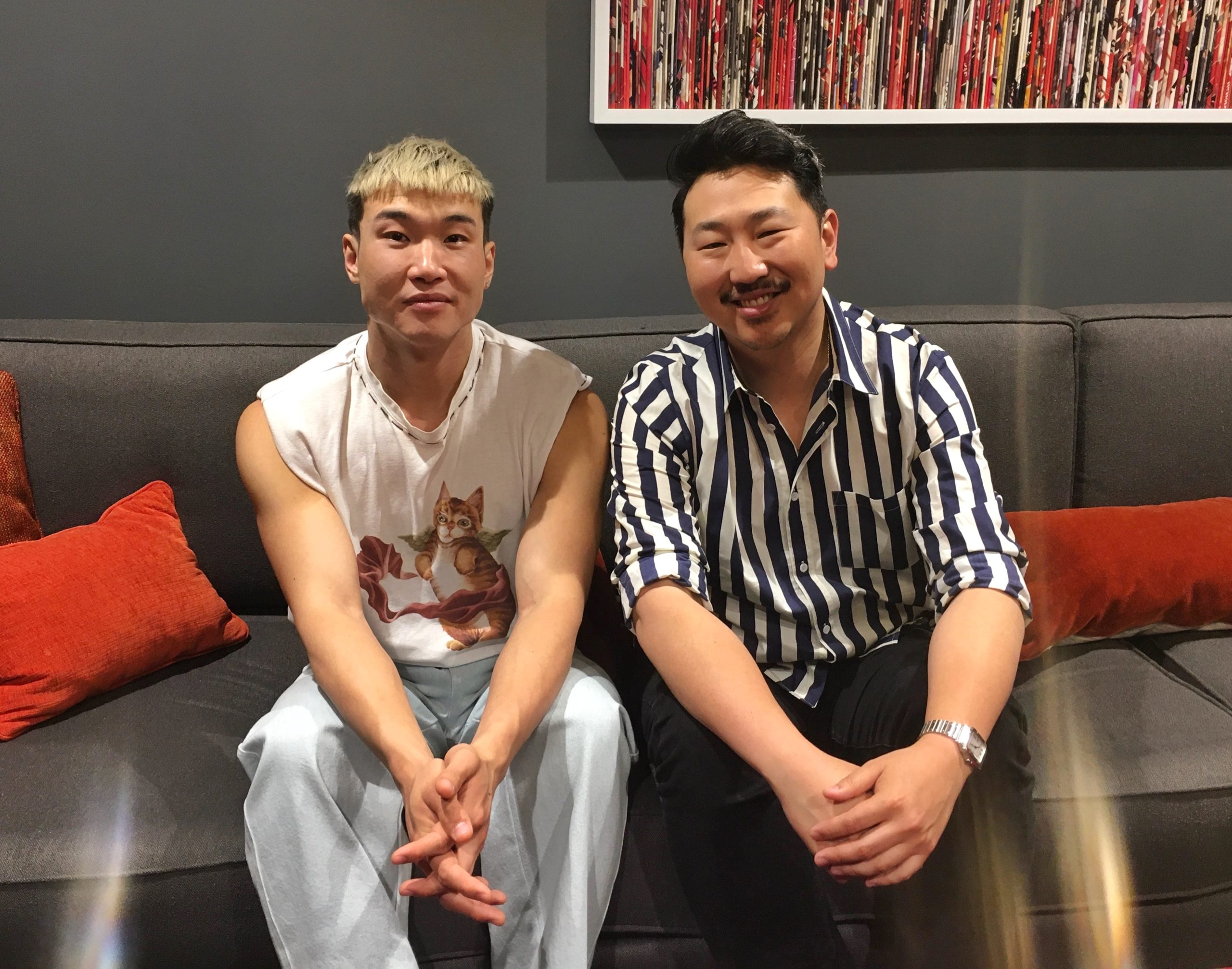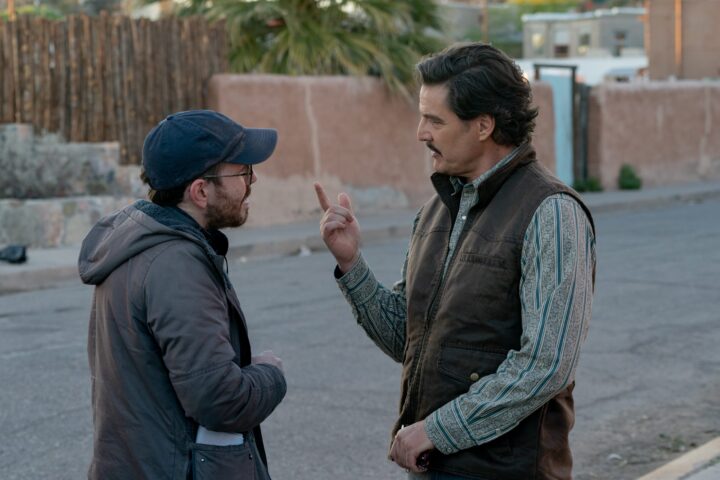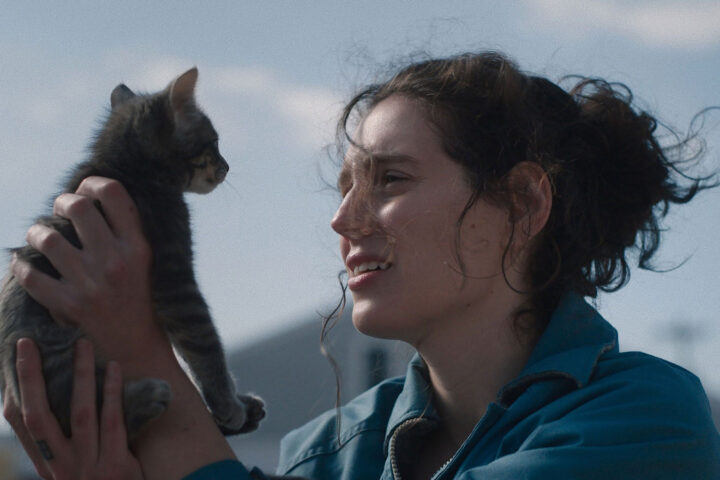What if Jane Austen had taken passage from Georgian England to 21st century Fire Island and befriended a cheerfully sardonic, gay confidant en route? As evidenced by a funny and heartfelt new romantic comedy modeled on Austen’s seminal Pride and Prejudice, such an author’s sojourn might have revealed both unexpected kinship and unlikely inspiration. Certainly Austen would still have been motivated to craft her masterwork of social commentary and romance, albeit against a slightly more ribald context, one that certainly wouldn’t have lacked for wit.
Whip-smart actor, comedian and screenwriter Joel Kim Booster and director Andew Ahn (Driveways) have deployed Austen’s supple structure (and a clear love for the modern romcom) against their supremely enjoyable new comedy Fire Island (Hulu, June 3), telling the story of a tight-knit group of young friends vacationing on the sun, sand and pine-covered gay mecca while navigating amorous pursuits, friendship dynamics and class warfare.
Booster, the actor turned longtime stand-up tired of the narrowcasting of Asian-American men in American film, took a DIY shot at course correction in crafting Fire Island‘s sparkling screenplay, giving himself a heck of an enjoyable turn as the funny, tack-sharp best friend (and real life best friend) to SNL’s Bowen Yang, seeking love on holiday while Booster, his ever faithful partner-in-crime, looks out for his best interests.
There is much fun to be had in Fire Island as the ensemble navigates the island’s parties and potential paramours. But Booster and Ahn also excoriate social class schisms within the gay community while imagining some grand romantic possibilities, courtesy of their dashing, Darcy’esque co-star Conrad Ricamora (terrific in the currently running off-Broadway revival of Little Shop of Horrors). Did I mention the ever reliable and stalwart Margaret Cho shows up, endearing as always, as a sort of housemother (what else?) to Booster, Yang and a collection of amusingly drawn, young gay men?
I recently caught up with Booster and Ahn at Chicago’s Virgin Hotel to chat about Fire Island‘s laugh-out-loud humor, romantic heart and the importance of specificity in the subject matter, which knows its core audience and hits all of its targets. Both amiable and spirited, we laughed a lot, and often.
I think I have probably seen every gay movie that has ever been made. You guys probably have as well.
Joel Kim Booster: My favorite movies when I was in high school- I would track down all of those TLA movies…
Of course! Remember the TLA catalog that would come in the mail? That somehow got routed to my office. (laughter)
JKB: Mambo Italiano, Big Eden, Adam and Steve—I loved all of those movies. As much as this is a love letter to Jane Austen it is also a homage to big romcoms, which I also grew up watching.
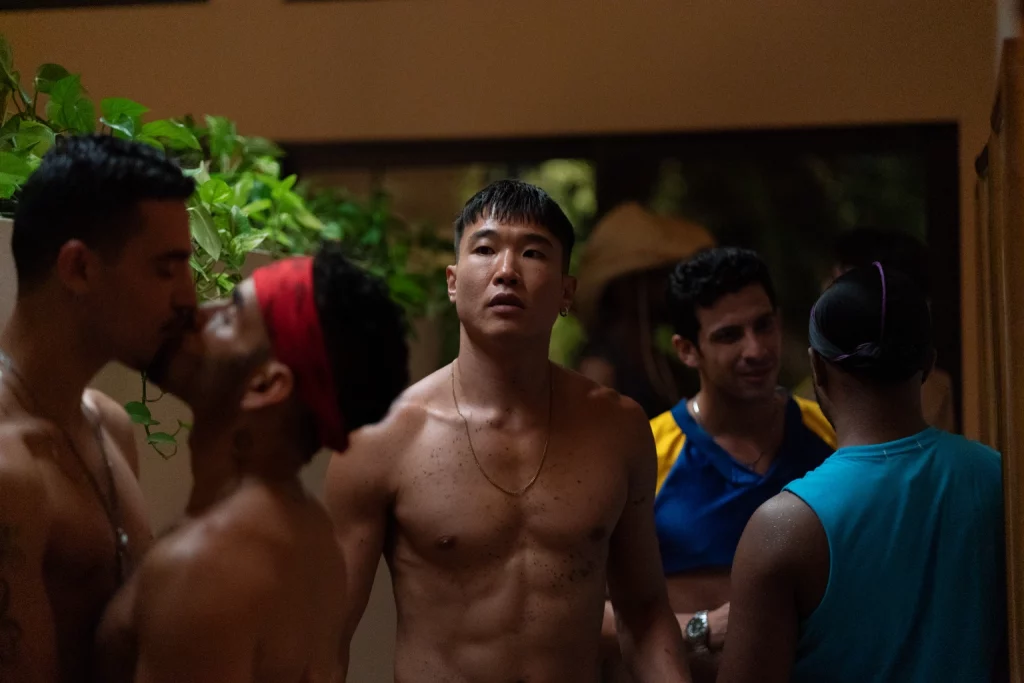
Joel, tell me a bit about playing this character, which I believe is somewhat of an approximation of yourself. You get to be a lot of things. By turns you are funny, sexy, charming, a good friend, smart and many other things. You have written a great role for yourself. Can you share a bit about that?
JKB: Yes! For me, it is two things. I wrote this because part of the reason I walked away from acting back in 2011 and started doing stand-up was because I was very frustrated with the roles that were available to Asian-American men at the time. I think in 2011 I got called in to be a Chinese delivery boy five different times across many different mediums. Stand-up was an outlet for me to perform and tell a story and be myself; I could tell a more accurate version of myself. In writing this script it was an opportunity to write a complicated, interesting character that I don’t think Asian-American, and specifically gay Asian-American men, are used to seeing onscreen.
I am all of those things you mentioned, but I am also deeply kind of an asshole too! I thought it was important to show all of the different facets of my personality. There is a lot of me in this story and I also think there is a lot of Bowen in his character of Howie. I wanted a bit a traditional romcom ending for one of us and it made more sense for it to be Bowen. But it is also deeply me, I think, and the duality of my own wants and desires; wanting the romance and love but also feeling for all of my 20s that I did not want a boyfriend. It has only been recently, at age 34, that I have entered into a relationship. So a lot of me was put into every character in this movie.
So the whole discussion of monogamy in this film comes from you?
JKB: Yes absolutely!
There are two happy endings here. First we have Bowen, but then we have the classic delay, delay and delay of two people who are meant for each other while we are waiting for them to realize it.
JKB: Yes, it is a little bit ambiguous. It could end this week or go on. We will have to wait for the sequel to find out what happens to them.
I think you just described every modern relationship. Andrew, why this film for you? You recently made Driveways, a critical and audience success for you. What made this one next?
AA: Yes. I know a lot of people were not expecting me to do something like this and when I interviewed for this job many of the questions centered around, ‘Can you be funny? How would you do the comedy in this?’ And I wanted to do it because yes, I saw the romcom format and I saw the super fun comedy, but I also could tell that this film had a real heart. I knew I could do that and that I would protect it. So it felt like any other movie I would make, where I want to love all of these characters and their relationships and how much they care for and support each other. I love that this is a film about queer, Asian-American friendship and joy and that is not something I have had an opportunity to do in my career despite making a lot of gay, Asian-American things. So this was a real opportunity to pay tribute to my community and friendships with folks in a way that is a super important part of my life.
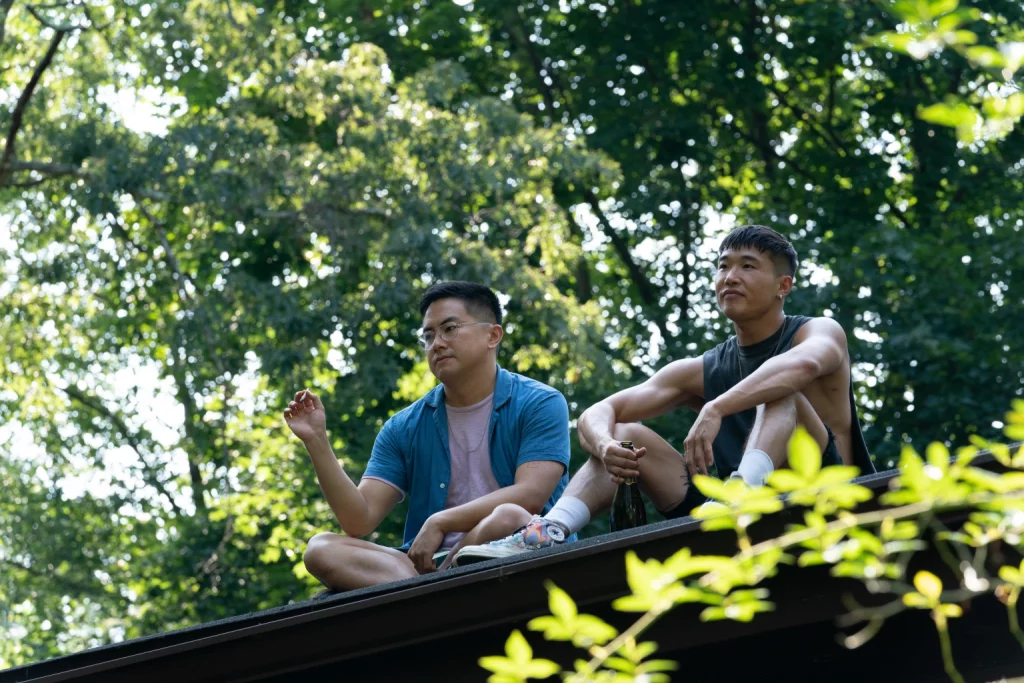
A lot of times we see gay films that are very specific to their core audience. This one felt culturally specific in that way but also universal in its story of friendship, falling in love and romance. I thought that macro human context was important and I think anybody will enjoy this film, perhaps with exception of maybe that scene in the back room!
AA: (Laughter) That was very important to us!
By the way, during that scene I loved seeing the Disney logo on the bottom of my screener copy. (laughter)
AA: I am very curious to know if there is another orgy in a Disney film! But I think both Joel and I talked about this and we get that there is an opportunity here. We are working with Searchlight and that is a way for us to get out there where everybody could watch and enjoy. At the same time I think we really do care about the queer audience and that is for whom we made this. It is really difficult to make a film for everyone and I think if you really focus on making it for one audience then you make a better movie. I talk about how I want this to be for queer people and, more granularly, for queer Asian-Americans. In a weird way I also made this for Joel. I wanted him to be happy. So regardless of how people interpret the movie and may enjoy it or hate it—as long as Joel loves the film, that is really important to me.
JKB: It was really important for us to not feel pedantic in what we were making. Searchlight, kudos to them, gave us a lot of leeway to be very specific. I think both the intended and straight audiences are going to know if they are being explained to and I think it is much more authentic and enjoyable, even for people outside of the intended audience, when it is just very confidently made for a specific audience. I think people are along for that ride and also that you are right—the themes about chosen family and friendship and all of those things are universal.
I also felt its critique of gay social classes was pointed and effective, and something that anyone in the intended audience will immediately recognize and understand. It is something you don’t have to go to Fire Island to experience.
JKB: Yes, just to Boystown.
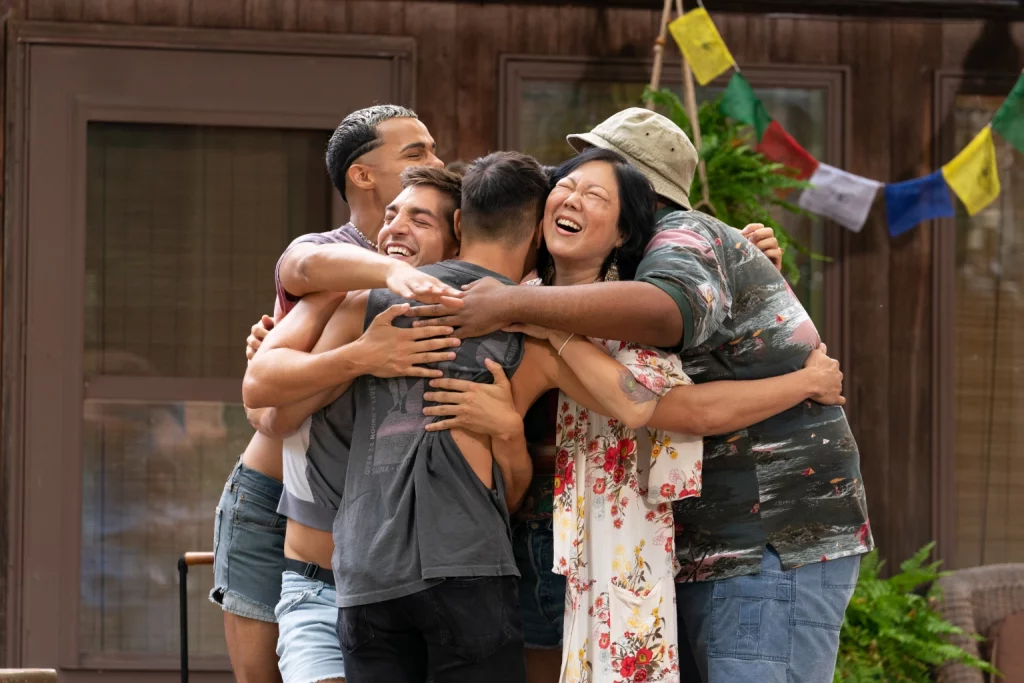
So I liked that the film offered a utopian vision of what can happen if you’re able to let go of these superficial, fabricated lines of demarcation. For me being, being slightly older, I sometimes catch myself railing, ‘That younger generation! They don’t know anything about Stonewall and they don’t care to!” (laughter) I should probably stop doing that. But I think the movie advocates for a more holistic, united view of a community.
AA: Yes, exactly. That is Fire Island in a nutshell for me. The first time I went it was very freeing. You don’t realize how much weight you carry around living in a straight world until you are in a place like Fire Island and that weight is lifted and it is transformative. But it’s transformative as it is you are still butting up against all of that toxicity. And it is a combination of all of those things that galvanizes you as a gay person in a real way.
I laughed out loud in the film many times. I wrote some of the lines down because I thought they were very witty. I particularly loved the name check for Cherry Jones. (laughter)
AA: I’m so glad!
JKB: Thank you so much! Speaking of the younger generation of gay men who won’t get that joke!
Joel, important question—you don’t really hate Call Me by Your Name, do you? (laughter)
JKB: No! I have seen it once or twice and it’s probably not my favorite movie. We actually tried (that line) with a couple of different movies!
AA: We did try it with a couple different movies! There’s something about that film.
Andrew, how do you go about visually capturing Fire Island? I much enjoyed the night scenes, which place us right in that world. Can you share a bit about your approach to shooting the island?
AA: Yes! I remember being very inspired by the screenplay, which Joel wrote very visually, and the dichotomy of Fire Island. It is both a beautiful, natural landscape but also this very constructed social hierarchy of queer people and I saw that in the way that we were going to shoot the film. I envisioned a daytime Fire Island that was sun soaked and bright, and then a nighttime Fire Island that was dark, neon and moody. I wanted to lean into both of those aesthetics and I think the juxtaposition of both gives the film a dynamic range. I worked with our cinematographer, Felipe Vara de Rey, to really capture the highs and lows of a Fire Island trip through these different aesthetics. We never wanted it to look the same all the way through. We wanted to have hills, valleys, dark and bright, and that was the attitude that we took through all of the film. From the more dramatic, vulnerable moments to the super comedic moments we did not want to reduce anything but rather to go for the boundaries.
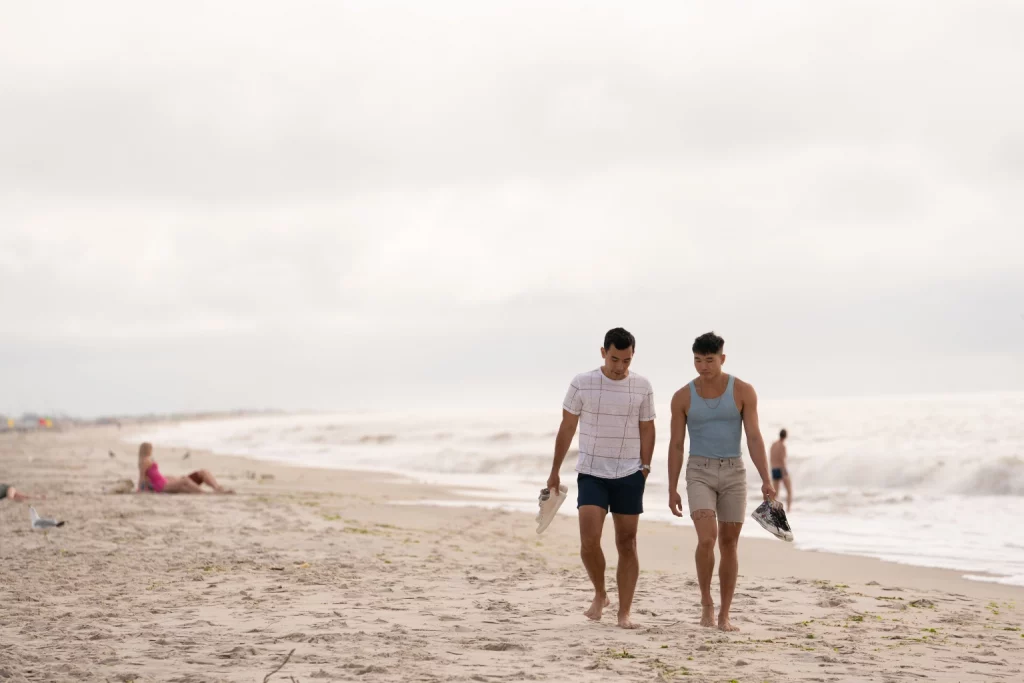
Conrad Ricamora, who plays Will, the film’s latter day Mr. Darcy, is quite good. Joel, you have a big, romantic scene together at the end of the film. I enjoyed the chemistry; the push-pull that happens between you both and how this moment is delayed. The relationship is well constructed so when that moment arrives it has been earned. It would be great to hear about the dynamic of working with him because he has a tough job, withholding for much of the film.
JKB: Absolutely! We really searched and searched and searched. The part was not written for an Asian-American guy, and I remember when Conrad came in I did not know if it was going to work if he was the same race as me. And I remember that when he came in to read with me, the second he stepped outside the door I turned Andrew and said that we could rewrite the character. Maybe it’s an indictment of the industry because he is such a great actor and it’s so easy to fall in love with him on the set. Half of the battle was won in the chemistry. I think what you’re talking about—because of the delayed nature of the relationship—there really needed to be heat between us, even in moments when we don’t like each other. This was required for the end to work.
AA: I love that chemistry between Conrad and Joel. Conrad was the only actor to fluster Joel. Joel forgot his lines and he wrote the script! At every other chemistry read (with other actors), Joel felt like he was always in charge. Conrad found a way to get under his skin in a way that was very much Elizabeth and Darcy. I think what Conrad does is so brilliant. You have to go from really despising him at the beginning to falling in love with him at the end, and he really finds that very Darcy-esque quality so effortlessly. By the time we see him make a fool of himself and dance, the audience is in. I love that.
I’m not embarrassed to say that I shed a tear at the end.
JKB: Aw, thank you!
AA: Thank you!
And Joel, you must be very funny in life because you even made me laugh out loud at a Red Lobster reference. (laughter)
JKB: That’s inspired by a Margaret Cho story!
Special thanks to Joel Kim Booster and Andrew Ahn for this interview.
Photo credit: Jeong Park
